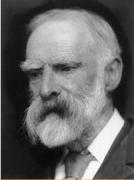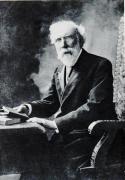|
|
||||||||||||||||||||||||
 |
Featured person
Recently added |
James Bryce (1838 - 1922): |
||||||||||||||||||||||

|
| James Bryce |
James Bryce was born in 40 Arthur Street, Belfast, on 10 May 1838, the eldest son of James Bryce (1806–1877), schoolteacher and geologist.
Bryce spent his first eight years in Ulster, but in 1846 followed his father, who was appointed rector, to the high school of Glasgow, and then for a year went to study under his uncle Dr Reuben John Bryce at Belfast Academy, before entering the University of Glasgow in 1854. In 1857 he went on a scholarship to Trinity College, Oxford, graduating in 1862.
Bryce was called to the bar and practised in London for a few years, but soon returned to Oxford as Regius Professor of Civil Law, a position he held between 1870 and 1893. From 1870 to 1875 he was also Professor of Jurisprudence at Owen's College, Manchester. His reputation as an historian had been made as early as 1864 by his work on the Holy Roman Empire. With Lord Acton, he founded the English Historical Review in 1885.
Bryce was a Liberal in politics. In 1880 he was elected to parliament for the Tower Hamlets constituency in London. In 1885 he was returned for South Aberdeen, where he was re-elected on succeeding occasions and remained a Member of Parliament until 1907. He served as Under-Secretary of State for Foreign Affairs (1886), Chancellor of the Duchy of Lancaster (1892) and President of the Board of Trade (1894–95). Bryce served as Chief Secretary for Ireland from 1905 to 1907, where he made little impression.
In 1897, after a visit to South Africa, Bryce published a volume of Impressions of that country, which had considerable weight in Liberal circles when the Second Boer War was being discussed. He was one of the harshest critics of British repressive policy against Boer civilians in the South African War, condemning the systematic burning of farms and the imprisonment of old people, women and children in British concentration camps. In 1907 Bryce was appointed British Ambassador to the United States of America where he served until 1913 successfully strengthening the Anglo-American friendship.
As an author, Bryce quickly became well known in America for his 1888 work, The American Commonwealth. The book thoroughly examined the institutions of the United States from the point of view of a historian and constitutional lawyer, and it at once became a classic.
On his return to Great Britain he was raised to the peerage as Viscount Bryce, of Dechmont in 1914. Following the outbreak of the First World War, he was commissioned by Prime Minister H. H. Asquith to prepare the official Bryce Report on alleged German atrocities in Belgium. The report was published in 1915, and was damning of German behaviour against civilians.
Bryce also strongly condemned the Armenian Genocide that took place in the Ottoman Empire mainly in the year 1915. Bryce was the first to speak on that subject in The House of Lords, in July 1915, and later, with the assistance of the historian Arnold J. Toynbee, he produced a documentary record of the massacres, published by the British government in 1916 as the Blue Book.
During the last years of his life, Bryce served at the International Court at The Hague, supported the establishment of the League of Nations and published a book about Modern Democracy in 1921 that was rather critical of post-war democracy. Specifically, he strongly opposed the new right of women to vote.
Bryce became a fellow of the Royal Society in 1894. His Studies in History and Jurisprudence (1901) and Studies in Contemporary Biography (1903) were republications of essays. In earlier life he was a notable mountain climber, ascending Mount Ararat in 1876, and publishing a volume on Transcaucasia and Ararat in 1877. He was president of the Alpine Club 1899-1901. In 1907 King Edward VII made him a Member of the Order of Merit. He was also President of the British Academy from 1913 to 1917.
Bryce died on 22 January 1922 in Sidmouth, Devon and was cremated at Golders Green Crematorium. The viscountcy died with him. In 1965, the James Bryce Chair of Government (changed to Chair of Politics in 1970) was endowed in his honour at the University of Glasgow.
| Born: | 10 May 1838 |
| Died: | 22 January 1922 |
| Patrick Devlin |


Home | Our Policies | Plaques | Browse | Search | Sponsors | Links | Help | Contact
Privacy & Disclaimer | Cookie Policy | Site Map | Website Design By K-Point
© 2024 Ulster History Circle









